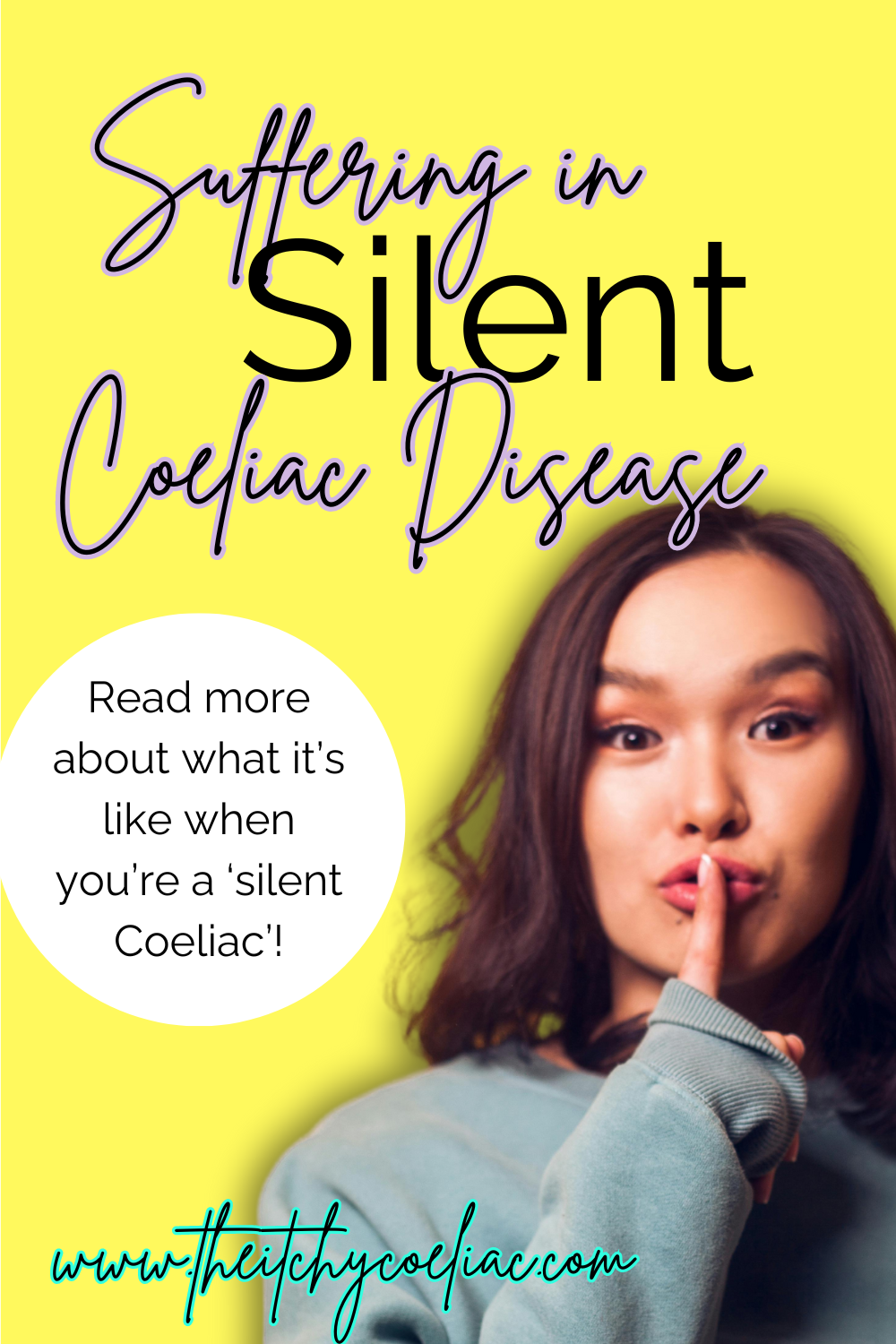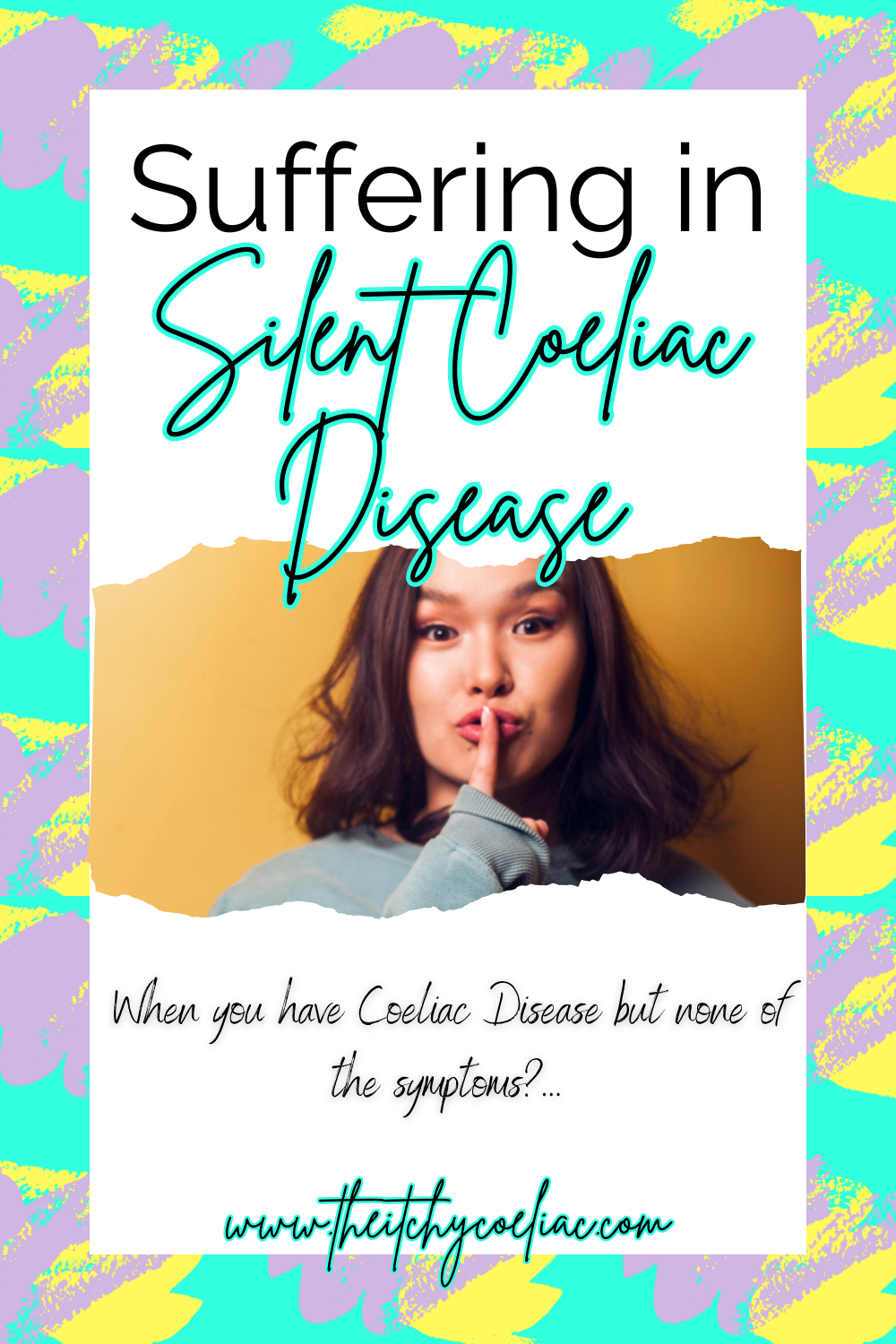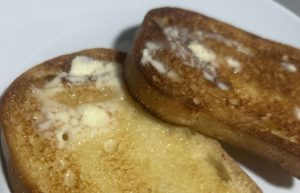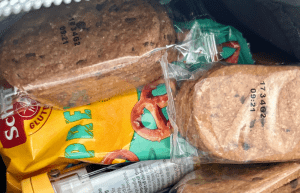When people talk about Coeliac Disease, it’s usually punctuated by the life altering symptoms that arise when they eat gluten. But what about those of us who don’t have those symptoms?
In this post I go into more detail about what it means to be a silent Coeliac, feeling that imposter syndrome and how to fight it and accept your condition.
Why not pin it for later?

What is a silent Coeliac?
If you’ve already read my post about what Coeliac Disease is, then you will already have a good idea on what exactly it means and how it can affect those that have it.
Check it out here if you haven’t read it yet! Coeliac Disease: Learning the Gluten Free Life.
When you are asymptomatic or silent Coeliac this means that when you eat gluten you may not even notice that there is anything wrong. This is because we don’t get the symptoms and effects that others with Coeliac might have.
Most people that have been diagnosed with Coeliac Disease eat something containing gluten and might show some of the symptoms below:
- Diarrhoea, constipation or excessive wind
- Bloating or stomach cramps
- Anaemia, vitamin deficiency and tiredness
- Sickness and vomiting
For some people these symptoms can be pretty aggressive and cause them to be ill for days at a time. While for others they can be more mild and only affect them for a short time.
For a silent Coeliac, we experience none of it (or nothing noticeable at least).
Even though what’s happening inside our bodies is the same, we usually are able to go about our day like nothing’s wrong.
When someone with Coeliac eats gluten, their immune system attacks their own tissues. This damages the lining of the gut in the intestines. This prevents the body from being able to absorb nutrients and vitamins properly.
This is all still happening to us silent Coeliacs whenever we eat gluten. We just don’t tend to have a physical reaction to it that indicates the damage being done.
Naturally, this makes things a bit more complicated when we get that call from the doctors telling us we can never eat some of our favourite foods again!

Challenges of the Silent Coeliac
Being asymptomatic when you have Coeliac Disease can be difficult for a number of reasons but it can also be pretty dangerous.
Delayed Diagnosis
As we fail to notice that there are any obvious symptoms of illness, people with silent Coeliac are much less likely to seek medical help. Makes sense, you don’t go to the doctors if there’s nothing wrong with you, right?
More often than not, silent Coeliacs get their diagnosis by accident. That was what happened in my case. I went in for some unrelated issue and the doctor noticed a problem with my blood work. Next thing I knew, I was having an endoscopy and a colonoscopy and was told I had Coeliac Disease!
I was diagnosed at the age of 26. A lot of people that are silent Coeliacs don’t receive their diagnosis until much later in life.
Another reason for this is that silent Coeliac can often be misdiagnosed as some other kind of issue. This can be due to differences in the processing of blood testing or because the symptoms patients are showing suggest a different issue altogether.
People might be diagnosed with iron deficiency anaemia due to low levels of iron and tiredness but in fact it’s due to them having Coeliac Disease!
Long Term Health Affects
Because it can take much longer to be properly diagnosed with Coeliac Disease when you are asymptomatic, it means the effects it can have on your health can be more severe.
Without treatment of a completely gluten free diet, Coeliac Disease can lead to a number of health issues. These can include anaemia, osteoporosis, fertility issues, disorders of the nervous system and a possibility of cancer.
The longer you continue to eat gluten, the more damage is being done to your body. So for the undiagnosed silent Coeliac, we’re at high risk of having these issues later down the line. Ironically, then leading to a realisation that we also have Coeliac Disease!
Mental and Emotional Challenges
One of the things I found to be most difficult when I was diagnosed was the required mental shift.
It can seem crazy that all of a sudden you can’t have bread anymore even though for years you’ve been eating it and seemingly been fine.
Making that change in your thinking that actually it will harm you if you eat it can be extremely hard. Your brain is looking for the evidence. So while you’re telling yourself to put down the bread roll, your head is like “Why? We love these!”
When you touch a knife and cut your finger, you feel the sting and you see the blood. You know not to do that again because it will hurt you. It’s a lot harder to convince yourself of this when you’re not seeing the effects of the action.
Those who do show symptoms of Coeliac Disease have the incentive of sticking to a gluten free diet so that they’re no longer sick. Asymptomatic Coeliacs don’t have this incentive which can make it harder to be strict about sticking to it.
I talk a little more about this in my post about cheating Coeliac Disease. Read it here!
Playing Detective
It’s arguably harder for people that are silent Coeliacs to feel confident in what they’re eating or where they are eating.
We don’t get an alert from our body if gluten is accidentally ingested. If there’s some cross contamination or a hidden gluten in something – we would have no idea!
There are things we can do to ensure we’re not accidentally glutening ourselves. Making sure to check labels like you’re looking for buried treasure is one. Asking as many questions as you can about food prep is also key to avoiding accidental gluten.
All Coeliacs have got to ensure that we know the strange hidden places that gluten might be hiding and keep an eye out for them. But when you’re a silent Coeliac it’s extra important so you don’t accidentally continue to have gluten without realising it.
Fighting that Imposter Syndrome
When I was diagnosed, the first place I went for advice and support was the internet. I looked at blogs and forums and tried to soak up every bit of information I could about Coeliac Disease. But I found that I felt very out of place.
There were a lot of posts comparing symptoms, or talking about how they’d been accidentally glutened and were ill for days.
I felt like a fraud reading these accounts and knowing that I could quite easily scoff down a pizza and wouldn’t have any issues (aside from the internal ones of course!)
Not having any symptoms meant I hadn’t really been taking it too seriously. I just figured ‘what harm will it do?’. It took some time to tell myself that I did have this autoimmune disease and I did have the same effects as others. I just couldn’t see them. Again, a big mental shift!
Being a silent Coeliac also meant it wasn’t just myself that needed to get used to the change. My family had watched me eat bread, pasta, pizza for my whole life and not so much as get a tummy ache.
There comes this stigma and misconception that ‘a little bit won’t hurt you’ or ‘you don’t get sick so it’s fine to have some’.
Unfortunately, that is not the case.

Education and Acceptance
Whether you have symptomatic Coeliac Disease or you’re a silent Coeliac, the bottom line is always the same. You must cut out gluten from your diet to avoid health complications later down the line.
It wasn’t easy but I knew I just had to accept that and embrace the gluten free life.
I ignored my imposter syndrome and got involved in the online communities, Instagram being a big help. Despite my lack of typical symptoms, people there still understood that I did have Coeliac Disease and I was made to feel like one of them – because I was!
Seeing others with Coeliac who did have symptoms also helped me to be more understanding of it and realise the seriousness of it.
Another way I found that helped me keep myself in check was by educating those around me.
I didn’t go on to them about being Coeliac for hours (nobody wants to be that person!) but for example if we were out at a restaurant and they were encouraging me to ‘just have a bit’, I would let them know why I couldn’t do that. I would explain about the issues it could cause to my health and the damage it would create.
Not only was it a good way to spread more education and awareness about Coeliac Disease (specifically asymptomatic Coeliac) but it also put that firm reminder in my own head – you cannot eat this and this is why.
It’s that old phrase, practise what you preach!
So being a silent Coeliac…
So, that’s just a little insight into what it’s like to be someone who has silent Coeliac Disease.
It comes with all its challenges from the struggle to even get diagnosed to fighting those stigmas and misconceptions around the condition. The most important thing is to recognise that despite the absence of the typical symptoms, the dangers to your health are very real.
By accepting your fate and making sure to advocate for yourself with others, you can make sure that you’re still living your best gluten free life – even if to others it might seem like you don’t need to.
Luckily, the world of Coeliac is growing every single day. There’s more research, more conversations happening and it’s becoming easier to live with the condition than ever before. Whether you’re symptomatic or not we can all find ways to thrive and support each other through having Coeliac Disease.
I would highly advise looking into the online communities for people with Coeliac Disease. There are some brilliant people there offering support, encouragement and advice. Or if you’re more extroverted, try finding Coeliac groups in your area!
If you’re looking for somewhere to start, go follow me and say hi on Instagram at @theitchycoeliac!






